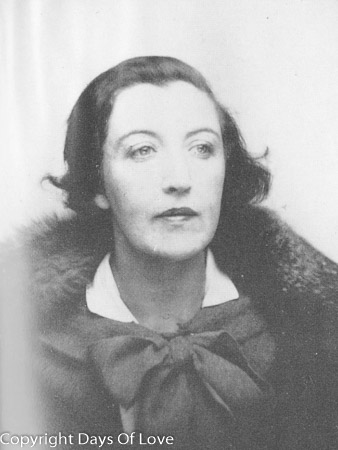

Queer Places:
Kensal Green Cemetery, Harrow Rd, London NW10 5NU, Regno Unito
 Dorothy
Ierne Wilde, known as Dolly Wilde, (July 11, 1895 – April 10, 1941) was an
English socialite, made famous by her family connections and her reputation as
a witty conversationalist. Her charm and humour made her a popular guest at
salons in Paris between the wars, standing out even in a social circle known
for its flamboyant talkers. She has been romantically linked to
Alla Nazimova.
Dorothy
Ierne Wilde, known as Dolly Wilde, (July 11, 1895 – April 10, 1941) was an
English socialite, made famous by her family connections and her reputation as
a witty conversationalist. Her charm and humour made her a popular guest at
salons in Paris between the wars, standing out even in a social circle known
for its flamboyant talkers. She has been romantically linked to
Alla Nazimova.
Wilde, born in London three months after her uncle Oscar Wilde's arrest for homosexual acts, was the only child of Oscar's older brother, Willie. Her father died just a few years later, and she was raised by her mother and her stepfather, the translator Alexander Teixeira de Mattos.
In 1914, she travelled to France in order to drive an ambulance in World War I. About 1917 or 1918, while both were living in Paris, she had an affair with one of her fellow ambulance drivers, Standard Oil heiress Marion "Joe" Carstairs, who in the 1920s became a speedboat racer and was known as "the fastest woman on water."[1] Although she "revelled in" attracting both men and women, Wilde was primarily, if not entirely, lesbian.[2]
In 1925 or 1926, Dolly Wilde had a brief affair with the film star Alla Nazimova (later Nancy Reagan’s godmother).
F. Scott Fitzgerald was furious when, in May 1929, Dolly Wilde made a pass at Zelda Fitzgerald. More often, with heterosexual men, she was something of a cock-tease. According to her cousin Vyvyan Holland, Oscar Wilde’s son, ‘she was always taking her horse to the water and then refusing to let him drink’. The men who were more at ease with her sense of fun tended to be homosexual. She was a member of Stephen Tennant’s circle and went to Brian Howard’s famous Greek party dressed as Sappho.
Wilde drank to excess and was addicted to heroin. She went through several detoxification attempts, none successful; she emerged from one nursing-home stay with a new dependency on the sleeping draught paraldehyde, then available over-the-counter.[3]
In 1939 she was diagnosed with breast cancer and refused surgery, seeking alternative treatments.[4] The following year, with the Germans approaching Paris, she fled for England.[5] She died aged 45 in 1941, of "causes unascertainable", according to the coroner's inquest—possibly the cancer or possibly a drug overdose.[6]
Wilde's longest relationship, lasting from 1927 until her death, was with openly lesbian American writer Natalie Clifford Barney, who was host of one of the best-known Parisian literary salons of the 20th century.[7] She paid her first visit to one of Natalie Barney’s Friday evening salons at 20 rue Jacob on 27 June 1927. Late in the same year she hawked Barney’s novel The One Who Was Legion around London; but everyone she took it to, including Leonard and Virginia Woolf at the Hogarth Press, turned it down. A great intimacy developed between Dolly and Barney, to the extent that it was later said of her that Dolly was the only woman who could make Barney cry. Dolly appears as Doll Furious in Djuna Barnes’ Ladies Almanack (1928), Natalie Barney as Evangeline Musset.
Dolly Wilde was regarded by many as a gifted storyteller and writer, but she never took advantage of these natural talents. She was supported mostly by the generosity of others and by a small inheritance from her stepfather; her only written works were translations—often uncredited and unpaid—and animated correspondence with her friends.
My published books: